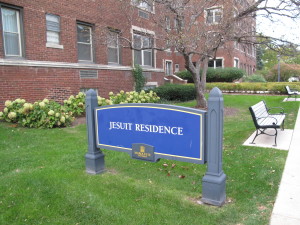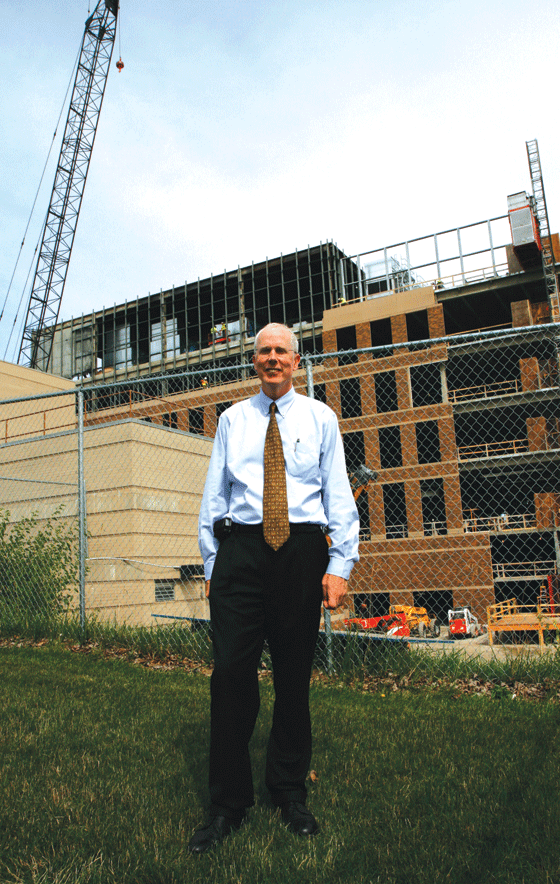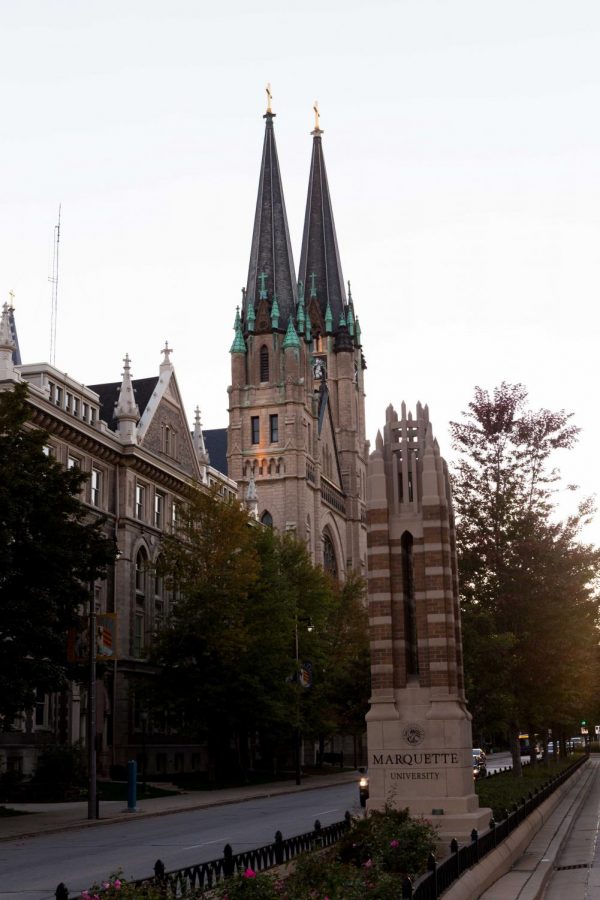 With a $10 million contribution from an anonymous donor, Marquette will build a new Jesuit Residence, renovate the center of campus and allocate new funds to need-based scholarships, Interim University President the Rev. Robert A. Wild announced Monday.
With a $10 million contribution from an anonymous donor, Marquette will build a new Jesuit Residence, renovate the center of campus and allocate new funds to need-based scholarships, Interim University President the Rev. Robert A. Wild announced Monday.
The renovation project, which will cost the university $15 million, will build a new Jesuit Residence in the 1400 block of W. Wells St. The present Jesuit Residence, located at 1404 W. Wisconsin Ave., will be torn down to increase campus green space and decrease the surface parking level area between Schroeder Hall and the Alumni Memorial Union.
The new residence will be built in the area where the parking lots in front of Schroeder Hall currently sit. The building will face south, toward Wisconsin Avenue, said Brian Dorrington, senior director of university communications, in an email.
Of the $10 million, $7.5 million will be donated to the construction of the new Jesuit Residence and $2.5 million will finance need-based scholarships. The university could not comment on whether these scholarship funds will be available for students enrolling in the 2014-15 academic year.
“Details are still being worked through with the anonymous donor as to how the scholarship resources will be used,” Dorrington said.
The remaining $7.5 million for the renovations will be funded through donations and construction will not begin until the additional money is raised. According to Dorrington, the university does not have an anticipated start date for construction.
“Efforts are already underway to raise the remaining $7.5 million for the building and related work,” Dorrington said. “This extraordinary gift will bring momentum to this work, but no specific timeline has been released.”
The news release cited the anonymous benefactor’s “desire to provide a future home to the members of Marquette’s community of Catholic, Jesuit priests who have dedicated their lives to serving others” as the reason to replace the present 98-year-old Jesuit facility. In a letter to faculty and staff announcing the $10 million donation, Wild said the new residence was “much-needed” due to “an increasing array of major maintenance problems.”
In October, flooding caused by a burst pipe displaced three Jesuits from their rooms, with residents only beginning to return this week. The Rev. Thomas Anderson, who mostly lives in Schroeder Hall as its hall minister but still has a room in the residence, said such problems are not uncommon. Due to the recent cold, many steam pipes have burst and a few years ago, the roof needed to be repaired.
In addition, Anderson said the current residence, which was formerly a hotel built in 1916 until it was purchased by Marquette in 1962 and turned into the Jesuit Residence in 1973, is not suited for the Jesuit community’s needs. The number of Jesuits working at Marquette is less than it used to be, but the large size of the Jesuit residence took a toll on maintenance costs.
“It’s a big facility to maintain,” Anderson said. “It has outdated heating equipment and water equipment. The costs of maintaining a building like that are much more expensive than building something modern and something that’s going to be more suited for our needs. We don’t need dining room space for 100 people. We need it for like 30 or 40.”
Due to an agreement with the Society of Jesus’ Wisconsin Province, Marquette is required to provide housing for the Jesuits who work for the university. The residence also houses Jesuits working for the Church of the Gesu, other parishes and the province office. Anderson said he did not know if the new residence will accommodate these Jesuits, but said the decision of where they will reside will ultimately be decided by the province.
Anderson said the new residence is ultimately part of the university’s master plan to help develop that section of campus.
“One of the things (University Architect Tom Ganey) presented to us was the university master plan,” Anderson said. “It has this vision of, just as how Wisconsin Avenue forms this corridor, there would be 14th Street as a new corridor. And to make that happen, the university will have to get rid of the Jes Res.”






